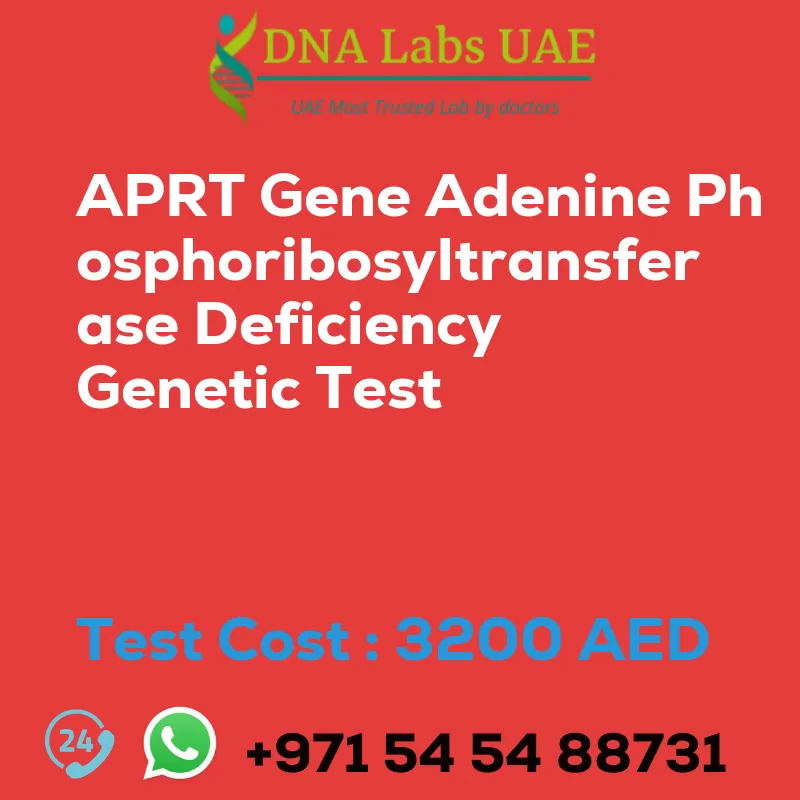APRT Gene Adenine phosphoribosyltransferase deficiency Genetic Test
Components
- Test Name: APRT Gene Adenine phosphoribosyltransferase deficiency Genetic Test
- Price: 3200.0 AED
- Sample Condition: Blood or Extracted DNA or One drop Blood on FTA Card
- Report Delivery: 3 to 4 Weeks
- Method: NGS Technology
- Test Type: Metabolic Disorders
- Doctor: General Physician
- Test Department: Genetics
Pre Test Information
Clinical History of Patient who is going for APRT Gene Adenine phosphoribosyltransferase deficiency NGS Genetic DNA Test. A Genetic Counselling session to draw a pedigree chart of family members affected with Adenine phosphoribosyltransferase deficiency.
Test Details
APRT gene adenine phosphoribosyltransferase deficiency is a rare genetic disorder that affects the metabolism of adenine, a building block of DNA and RNA. This condition is caused by mutations in the APRT gene, which is responsible for producing the enzyme adenine phosphoribosyltransferase. Individuals with APRT deficiency are unable to properly break down adenine, leading to the accumulation of a substance called 2,8-dihydroxyadenine (DHA) in the kidneys and urinary tract. Over time, DHA crystals can form and cause kidney stones, which can lead to kidney damage if left untreated.
NGS (Next-Generation Sequencing) genetic testing is a method used to analyze the DNA sequence of the APRT gene and identify any mutations or variations that may be present. This test can help diagnose APRT deficiency and determine the specific genetic cause of the condition. Early diagnosis of APRT deficiency through genetic testing is important as it allows for appropriate management and treatment strategies to be implemented. Treatment options may include a low-purine diet, increased fluid intake, and medications to prevent the formation of kidney stones.
It is recommended to consult with a healthcare professional or genetic counselor for more information on APRT gene adenine phosphoribosyltransferase deficiency and to discuss the benefits and limitations of genetic testing.
| Test Name | APRT Gene Adenine phosphoribosyltransferase deficiency Genetic Test |
|---|---|
| Components | |
| Price | 3200.0 AED |
| Sample Condition | Blood or Extracted DNA or One drop Blood on FTA Card |
| Report Delivery | 3 to 4 Weeks |
| Method | NGS Technology |
| Test type | Metabolic Disorders |
| Doctor | General Physician |
| Test Department: | Genetics |
| Pre Test Information | Clinical History of Patient who is going for APRT Gene Adenine phosphoribosyltransferase deficiency NGS Genetic DNA Test A Genetic Counselling session to draw a pedigree chart of family members affected with Adenine phosphoribosyltransferase deficiency |
| Test Details |
APRT gene adenine phosphoribosyltransferase deficiency is a rare genetic disorder that affects the metabolism of adenine, a building block of DNA and RNA. This condition is caused by mutations in the APRT gene, which is responsible for producing the enzyme adenine phosphoribosyltransferase. Individuals with APRT deficiency are unable to properly break down adenine, leading to the accumulation of a substance called 2,8-dihydroxyadenine (DHA) in the kidneys and urinary tract. Over time, DHA crystals can form and cause kidney stones, which can lead to kidney damage if left untreated. NGS (Next-Generation Sequencing) genetic testing is a method used to analyze the DNA sequence of the APRT gene and identify any mutations or variations that may be present. This test can help diagnose APRT deficiency and determine the specific genetic cause of the condition. Early diagnosis of APRT deficiency through genetic testing is important as it allows for appropriate management and treatment strategies to be implemented. Treatment options may include a low-purine diet, increased fluid intake, and medications to prevent the formation of kidney stones. It is recommended to consult with a healthcare professional or genetic counselor for more information on APRT gene adenine phosphoribosyltransferase deficiency and to discuss the benefits and limitations of genetic testing. |








